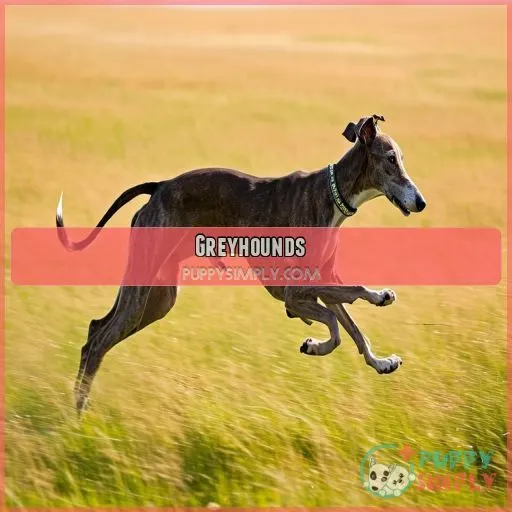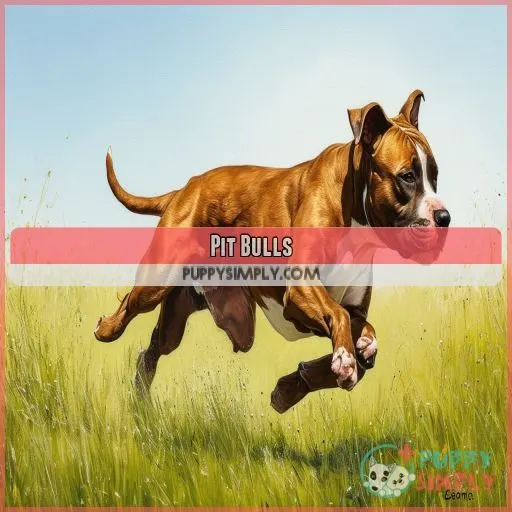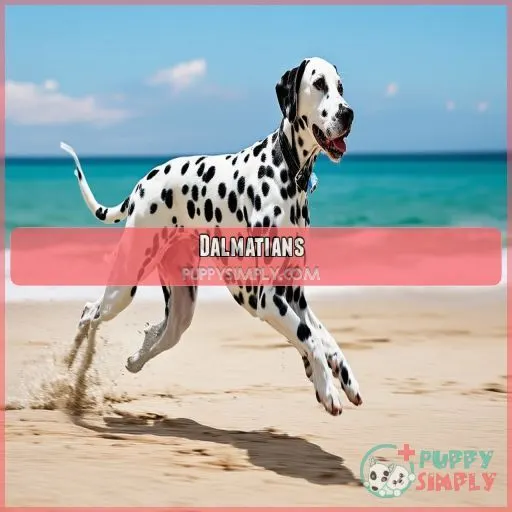This site is supported by our readers. We may earn a commission, at no cost to you, if you purchase through links.

With that, this guide will give a top-10 rundown of the best breed varieties to be jogging dogs in any home if you want sprinters or long-distance champions.
Find out which breeds will keep up with your running routine and become the perfect four-legged training partner.
Table Of Contents
- Key Takeaways
- Weimaraners
- German Shorthaired Pointers
- Vizslas
- Parson Russell Terriers
- Greyhounds
- Pit Bulls
- English Setters
- Golden and Labrador Retrievers
- Beagles
- Dalmatians
- Frequently Asked Questions (FAQs)
- What is the best breed of dog for inside a house?
- What dog is a good running dog?
- Which dog breed is the best to keep at home?
- Which dog is easiest to house train?
- How often should I run with my dog?
- What signs indicate my dog is overheating while running?
- Can I train a non-running breed to become a runner?
- Are there special diets for running dogs?
- How do I protect my dogs paws during runs?
- Conclusion
Key Takeaways
- Not all dogs are born to run, but some breeds are the Usain Bolts of the canine world. From Weimaraners to Vizslas, these four-legged fitness fanatics will have you panting to keep up!
- Size doesn’t always matter when it comes to running buddies. Parson Russell Terriers might be small, but they’re pocket rockets with energy to burn. Just be prepared for the occasional squirrel detour!
- Golden and Labrador Retrievers are the Swiss Army knives of running companions. They’re up for anything from a quick jog around the block to a marathon adventure, all while wagging their tails and melting hearts.
- Remember, even the best running breeds need proper training and care. Start slow, stay hydrated, and watch for signs of overheating. After all, you want a running partner, not a hot dog!
Weimaraners
You’ll find Weimaraners to be exceptional running companions due to their energetic nature and well-muscled build. These athletic dogs are ideally suited for long runs and trail adventures, making them a top choice for active owners who enjoy extensive outdoor exercise.
Energetic and Well-muscled
You’ll find Weimaraners to be powerhouses of energy and muscle. These silver-grey beauties are built for action, with a lean physique that screams endurance. Their boundless enthusiasm makes them ideal running partners, but be prepared to match their vigor.
While they excel in various terrains, remember to hydrate frequently and avoid hard surfaces for prolonged periods.
A well-structured dog running program can help harness their energy effectively.
Ideal for Long Runs and Trails
You’ll find Weimaraners are built for the long haul. Their muscular physique and impressive endurance make them perfect for tackling challenging trails and extended runs.
With their speed and stamina, these running dogs can keep up with you on various terrains. Whether you’re following dog running programs or exploring new paths, Weimaraners will be your loyal exercise companions.
Just remember to prioritize dog running safety and keep an eye on their energy levels.
German Shorthaired Pointers
German Shorthaired Pointers are known for their intelligence and high energy levels, making them excellent running companions. These dogs are fast and durable runners, capable of maintaining a steady pace over long distances, which makes them ideal partners for runners seeking a challenging workout.
Smart and High Energy
German Shorthaired Pointers are a cut above the rest where brains and vigor are concerned. They don’t just have athletic ability but are genuine problem solvers as well.
Their energy level rivals that of border collies and Australian shepherds, making them perfect running partners. With proper feeding and some decent obedience training, they’ll not give you any trouble while they trot with pace by your side.
With their razor-sharp intellect, it wouldn’t take long until they know your running schedule and what gear to expect, and in no time, adapt to your style.
Fast and Durable Runners
German Shorthaired Pointers aren’t just smart; they’re speed demons with incredible stamina. These high-energy pups can keep pace with you on long-distance runs, leaving other breeds in the dust.
Whether you’re hitting the trails or pounding the pavement, they’ll match your stride for stride.
Their endurance rivals that of Greyhounds, Doberman Pinschers, and American Foxhounds, making them ideal companions for runners who crave a challenge.
Vizslas
You’ll find Vizslas to be energetic and versatile running companions, capable of covering long distances at high speeds. These athletic dogs can keep up with you on extended jogs, making them an excellent choice for runners who want a canine partner that matches their endurance.
Energetic and Versatile
Think of Vizslas as the Swiss Army knives of running buddies. Their athleticism and endurance lend themselves well to most terrains. As you pound the pavement with these bundles of energy, here’s what you should keep in mind:
- Importance of Proper Diet and Hydration
- Consistent socialization helps manage their enthusiasm
- Regular visits to the vet ensure that they’re healthy and live long.
Vizslas are versatile and will adapt to any running style, whether that of a sprinter or the clichés of a marathon enthusiast.
Can Cover Long Distances at High Speeds
You’ll be impressed by your Vizsla’s high-speed endurance. These versatile runners can easily cover long distances, making them perfect for trail running or cross-country adventures.
Their stamina rivals that of golden and Labrador retrievers, Rhodesian Ridgebacks, and even Siberian Huskies.
Unlike Swiss mountain dogs or Belgian sheepdogs, Vizslas maintain their speed over extended periods, ensuring you’ll have a tireless companion for your most challenging runs.
Parson Russell Terriers
While Parson Russell Terriers are energetic and enthusiastic jogging companions, they require training to focus on what’s at hand.
You’ll find these highly energetic dogs can easily keep up with you on shorter runs.
However, their tendency to become distracted by small mammals or other enticing smells means you’ll need to invest in some obedience training for a smooth jog.
Active and Eager
Are you looking for a pint-sized powerhouse as a running companion? No need to look further than a Parson Russell Terrier. These little dynamos are simply filled with energy and love, making new adventures. Their compact size belies incredible stamina, lending perfectly to:
• Brief, vigorous sprints
Agility training sessions
- Exploring varied terrain
• Come with you on trail runs
With proper obedience training and the right running gear, these feisty terriers will keep you on your toes, come rain or shine.
Need Training to Avoid Distractions
| While Parson Russell Terriers make for great running buddies, the truth is that they’ve an exceptionally high prey drive, which could distract them. It will take you several hours of training so that they’re attentive during your runs. Gradually build up their attention span with recall practice and positive reinforcement, and think about using a sturdy leash or dog running gear so you can stay in control. This brief guide will help you: . | Focus of Training | Technique | Benefit |
|---|---|---|---|
| Recall | Whistle commands | Instant response | |
| Attention | Treat rewards | Better focus | |
| Leash etiquette | Heel training | Steady pace | |
| Distraction proofing | Gradual exposure | Dependable running buddy |
Greyhounds
You might be surprised to find greyhounds on this list, as they’re known for their sprinting abilities rather than endurance. While they’re not ideal for long-distance runs, greyhounds can make excellent jogging partners for shorter distances, offering a gentle and independent temperament that complements their athletic build.
Independent and Gentle
You’ll find Greyhounds to be a surprising addition to the best breeds to have as a running dog in your house. Unlike their active terrier cousins, these gentle giants have an independent streak.
They’re not clingy, which means you won’t have to worry about them constantly demanding attention.
Their calm demeanor makes them excellent companions for those who prefer a more laid-back running partner.
Sprinters Rather Than Distance Runners
While Greyhounds are gentle and independent, they’re not built for long-distance running. You’ll find these dogs excel as sprinters. When considering Greyhounds for exercise:
- Opt for short, intense bursts of activity
- Provide a safe, enclosed area for running
- Use proper gear like a padded harness
- Gradually increase exercise duration
Pit Bulls
Pit Bulls, known for their intelligence and low-to-the-ground stature, can be excellent running companions for shorter distances. Their muscular build and high energy levels make them well-suited for quick, intense bursts of exercise, making them ideal partners for sprints or shorter jogs.
Intelligent and Low to the Ground
While greyhounds are built for speed, pit bulls offer a different kind of running companion. You’ll find these intelligent, muscular dogs low to the ground, making them stable running partners.
Their loyalty is unmatched, rivaling even the versatility of vizslas.
With a blend of terrier agility and hound stamina, pit bulls can keep up with your pace.
They’re not just brawn; their smarts make training a breeze.
Excel at Shorter Distances
You’ll find pit bulls excel at shorter distances, making them perfect for quick jogs or agility training. Their muscular build and historical background as working dogs suit them for short bursts of energy.
Incorporate treat rewards to keep them motivated during runs.
Remember to protect their joints by avoiding long distances on hard surfaces.
With the right approach, your pit bull can become an enthusiastic running partner.
English Setters
English Setters are symmetrical and active dogs; to boot, they make fabulous running partners. With their playful nature, bottomed up by an athletic build, be sure to have them at par or even ahead of you during jogs. Their friendly nature further makes them a joy to have around.
Symmetrical and Active
While Pit Bulls excel at short distances, English Setters offer a different running experience. These symmetrical and active dogs boast adaptable coats, making them suitable for various weather conditions. You’ll find English Setters to be excellent running companions due to their:
- Balanced build for efficient movement
- Natural endurance for longer runs
- Versatile coat that regulates body temperature
Their graceful gait and athletic prowess make them a joy to run with, complementing your active lifestyle.
Enjoy Playing
English Setters aren’t just runners; they’re playful partners who’ll keep you on your toes. You’ll find their love for active playing perfectly complements your running routine.
These energetic pooches thrive on both physical and mental stimulation, making your jogs more engaging.
Incorporate fetch or hide-and-seek into your runs, and you’ll satisfy their exercise needs while strengthening your bond. It’s a win-win for you and your four-legged friend.
Golden and Labrador Retrievers
You’ll find Golden and Labrador Retrievers to be excellent running companions due to their friendly nature and physical capabilities. These breeds can adapt to both short jogs and longer runs, making them versatile partners for various fitness levels and running goals.
Friendly and Loyal
If one wants an affectionate running buddy, perfect corresponding pairs to the English Setter would be friendly and loyal Golden and Labrador Retrievers. For a running partner desiring a loving pet, you’ll find them to be:
• Pleasantly eager to please and easy to train
• Naturally sociable with people and other dogs
- Adaptable to various running environments
- Excellent motivation towards an active way of life.
Their unshakeable loyalty and friendly nature will make them ready companions for runners who want to bond well with their running canine chum.
Capable of Both Short and Long Runs
Golden and Labrador Retrievers aren’t just friendly faces; they’re versatile runners too. These working dogs can tackle both short sprints and long-distance jogs, adapting to various terrains with ease.
Their endurance is impressive, and they thrive on mental stimulation. You’ll find these pups ready for a quick neighborhood loop or an adventurous trail run.
They’re the Swiss Army knives of canine running companions, always up for whatever challenge you throw their way.
Beagles
Beagles are active and quick dogs that require plenty of exercise, making them potential running companions. While they’re known for shorter bursts of energy, some beagles can adapt to longer distances, but you’ll need to build their endurance gradually and monitor their stamina carefully.
Active and Quick
Although retrievers add versatility, beagles will bring another dimension to your runs. These small runners are known for their quickness and active nature. You’ll find their zest contagious as you get out on the trails together. Beagles—generally protective companions—can be versatile runners with proper training. Remember:
They’re scent dogs so take them on a leash
- These energetic pups need hydration
• Their size makes them perfect for apartment dwellers.
• They’re social animals, so perfect for group runs
Require Plenty of Exercise, Some Can Go Longer Distances
Beagles aren’t just cute; they’re exercise powerhouses. You’ll find these pups thrive on daily activity, keeping you on your toes.
While not all Beagles are cut out for marathons, some can surprise you with their stamina. With proper training, your Beagle might become your go-to long-distance running buddy.
Just remember, their noses might lead them astray, so keep that leash handy!
Dalmatians
Dalmatians are long-distance runners that thrive on exercise, making them excellent companions for avid joggers. You’ll need to be cautious about their tendency to pound the pavement, which can potentially lead to joint issues over time.
Long-distance Runners and Love Exercise
While Beagles are energetic, Dalmatians take endurance to a whole new level. You’ll find these versatile runners perfect for your long-distance adventures. Their stamina is legendary, making them ideal protective companions on extended jogs. To keep your spotted friend in top shape:
- Gradually increase mileage
- Incorporate hydration breaks
- Mix up terrain for balanced training
- Consider cold climate running for variety
Their love for exercise matches your passion for freedom and control in outdoor pursuits.
Prone to Pounding Pavement
While Dalmatians excel at long-distance running, they’re prone to pounding pavement. This can impact their paw pads and joint health over time.
To protect your spotted friend, consider varying running styles and surfaces. Dog boots can offer extra cushioning for pavement impact.
Frequently Asked Questions (FAQs)
What is the best breed of dog for inside a house?
You’ll want a dog that’s adaptable and low-energy for indoor living. Consider a Cavalier King Charles Spaniel, French Bulldog, or Greyhound. They’re calm, don’t need much exercise, and adjust well to apartment life.
What dog is a good running dog?
You’ll find your perfect running companion in breeds like Weimaraners, Vizslas, or German Shorthaired Pointers. They’re energetic, athletic, and built for endurance. Choose based on your lifestyle, climate, and running preferences. Always consult a vet before starting a running routine.
Which dog breed is the best to keep at home?
You’ll find the best home companion in a breed that suits your lifestyle. Consider energy levels, size, and temperament. Labs, Golden Retrievers, and Beagles are versatile choices, offering affection and adaptability for various living situations.
Which dog is easiest to house train?
Though a little tricky, training your puppy to fetch could be as easy as house training with these breeds. Breeds that have proven pretty easy to train about house training include the Labrador Retrievers, Poodles, and German Shepherds, which are nice to have around since they want to please and thereby learn fast, making life easy for you.
How often should I run with my dog?
You should run your dog 3-4 times a week. Increase the distance and intensity gradually. Start running for 15-20 minutes, staying in tune with your pup’s cue. Make sure to add in rest days at the end to recover. On top of that, you have to remember to keep it healthy and fun for the dog while doing so.
What signs indicate my dog is overheating while running?
Watch for excessive panting, drooling, and lethargy. Your dog’s tongue and gums may turn bright red. They might stumble, vomit, or collapse. If you notice these signs, stop immediately and cool your pup down.
Can I train a non-running breed to become a runner?
You can train non-running breeds to become runners, but it’ll take patience and gradual conditioning. Start with short walks, gradually increase distance and pace. Remember, some breeds may never be long-distance runners due to physical limitations. Always consult your vet first.
Are there special diets for running dogs?
Fueling your four-legged rocket requires more than kibble. You’ll want a high-protein diet with quality carbs for sustained energy. Consult your vet for personalized recommendations based on your dog’s age, breed, and activity level.
How do I protect my dogs paws during runs?
Protect your dog’s paws with protective booties or paw balm. Gradually toughen pads on varied surfaces. Check for cuts or debris after runs. Avoid hot pavement and ice. Trim nails regularly to prevent injuries.
Conclusion
The best breeds to have a running dog in the house can be quite an epic search, much like Forrest Gump’s run. Now you have a rundown of the top 10 canine jogging partners.
To be sure, there are unique characteristics in every breed that make them better at some running styles than others. Whether you’re a sprinter or long-distance enthusiast, don’t fear—there’s always a perfect four-legged companion somewhere out there.
Choose well and train consistently, and you’ll have a loyal running partner who’ll keep you motivated and active for years to come.
















